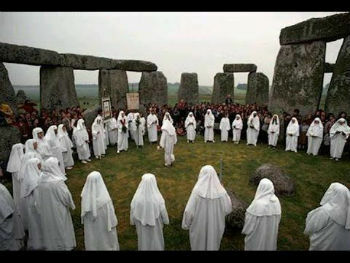The term paganism comes from latin, pagan, which designated those who lived in the countryside.
After the Christianization of the Roman Empire, the Church came to designate "pagan" all those who had not been baptized.
Religion
It is important to stress that the pagans were not a people apart. They were Roman citizens who lived in the countryside. Therefore, they had a stronger relationship with nature, and paid homage to it as well as worshiping the various Roman gods.
In this way, they worshiped the forces of nature such as wind, sun, water, fire and everything that was necessary to ensure daily survival such as successful harvests and the fertility of animals.
Among some characteristics of this religion we can mention:
- Nature is part of the divine essence;
- everything that exists on Earth is a particle of the divine;
- the cycles of nature are respected and celebrated with parties;
- some practice animism that is: the forces of nature are personified and worshiped as gods.
It is important to emphasize that paganism is not a
religion dogmatics where there are rigid moral principles. In certain aspects there is a hierarchy of priests, auxiliaries and initiates, but there is no sacred book from which the only source of knowledge comes.Thus, it is impossible to claim that there is only one type of paganism. After all, pagan cults varied from one region to another. In this way, the pagan religion has different traditions and strands such as Wicca, Witchcraft, Celtic, Norse, Slavic, etc. paganism.
Example: Wicca is paganism, but not all paganism is Wicca.
Anyway, in the second half of the 20th century, there was a reawakening of pagan and polytheistic religions. These people are called neopagans.
Polytheism

Neopagan ceremony held at Stonehenge.
Due to the diversity of “paganisms”, it is difficult to define just one aspect.
There are pagans who worship several gods, polytheists, while others just bow to the energies of nature.
read about Stonehenge
Paganism in Brazil
Paganism in Brazil follows world growth.
Since the publication of books such as “As Brumas de Avalon”, by Marion Zimmer Bradley and “O Caminho de Santiago” and “Brida”, by Paulo Coelho, the demand for this religion has increased.
In the first decade of the 21st century, the launch of the "Harry Porter" book series by J. K. Rowling would only reinforce this interest.
In any case, Afro-Brazilian religions can be considered pagan if we consider rural tradition, respect for nature and following natural cycles within their celebrations.
Read more:
- Norse mythology
- Greek mythology
- Egyptian Mythology
- Slav peoples
- Germanic Peoples
- barbarian peoples
- Catholicism
- Religious intolerance
- Autumn Equinox

